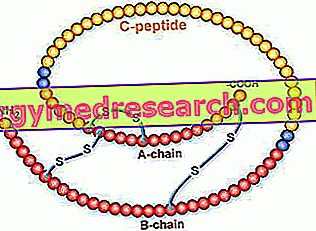Generality The presence of glucose in the urine ( glycosuria ) is a characteristic symptom of diabetes mellitus, which looks at case from the adjective "mellitus" to the typical sweet taste taken from the patient's urine. Diabetes, on the other hand, means "passing through" and refers to polyuria, that is, to the large amount of urine produced by the patient; regardless of the cause of origin, glycosuria and polyuria are in fact two closely related conditions
Category diabetes
Generality Diabetic nephropathy is a disease that deteriorates the renal function of some diabetic patients rather slowly but irreversibly, especially those in which the disease has existed for many years. Indicatively, this complication affects 30-40% of type 1 diabetics and 10-20% of type 2 diabetics
The exact causes responsible for the onset of diabetic nephropathy and its evolution towards renal failure are not yet clear. Currently, it is assumed that some factors, including hyperglycemia, arterial hypertension and an altered cellular transport of sodium, added to an innate genetic predisposition, are the main elements that favor the onset of diabetic nephropathy
Symptoms and manifestations As repeatedly expressed in the article, diabetic nephropathy is a progressive disease, which through stages of increasing gravity passes from the most total asymptomatic to chronic irreversible renal failure. STADIUM I Defined as a stage of glomerular hyperfiltration, it is characterized by the absence of symptoms and apparently normal renal function
Generality Peptide C is a peptide fragment embedded in the precursor insulin protein, pre-proinsulin. The measurement of this peptide in the blood is interesting from the clinical point of view, thanks to a half-life (20 minutes) higher than that of insulin (5 minutes). Furthermore, peptide C does not react with anti-insulin antibodies
Type II diabetes mellitus recognizes a long list of risk factors, which can be taken into account in the development of tests, able to quantify the probability that a person is suffering from diabetes or develop the disease over the years. The main risk factors for type II diabetes include: obesity (BMI> 30), especially the abdominal one (indicated by a waist circumference - the narrowest point of the abdomen - greater than 102 cm in men and 88 cm in women); sedentary lifestyle; unhealthy eating habits (which together with a sedentary lifestyle represent the main culprits of overweight and o
Premise Diabetes mellitus , or more simply diabetes , is a metabolic disease caused by alterations in insulin, a key hormone for maintaining normal blood glucose (sugar) levels. There are different types of diabetes mellitus, some decidedly more common and known than others. The most common types include type 1 diabetes, type 2 diabetes and gestational diabetes (also known as pregnancy-related diabetes)
Related articles: Diabetic ketoacidosis Definition Diabetic ketoacidosis is an acute metabolic complication of diabetes, characterized by hyperglycemia, hyperketonemia, and metabolic acidosis. This condition develops when the body's cells cannot use glucose as an energy source, so they begin to burn fat to meet the body's fundamental metabolic demands
Related articles: Gestational diabetes Definition Gestational diabetes mellitus (DMG) is a pathological condition characterized by variable glucose intolerance, which occurs for the first time during pregnancy. This happens because the hormonal changes that occur during gestation can make the cells less responsive to the action of insulin, a substance synthesized by the pancreas that has the task of regulating the concentration of glucose in the blood
Related articles: Diabetes Definition Used on its own, the term diabetes generally refers to diabetes mellitus, a metabolic pathology caused by a defect in the secretion and / or action of insulin, a key hormone that allows glucose to pass from the blood to the cells. The accumulation of this sugar in the blood determines a condition known as hyperglycemia, which is associated with the classic symptoms of diabetes
Related articles: Insulin resistance Definition Insulin resistance is a condition that occurs when the body's cells show poor sensitivity to insulin. Therefore, glucose cannot be absorbed by them in response to the action exerted by the hormone and remains in the blood. In most patients, hyperinsulinemia compensates for insulin resistance, even for several years








